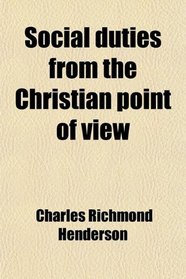Search -
Social duties from the Christian point of view
Social duties from the Christian point of view
Author:
Purchase of this book includes free trial access to www.million-books.com where you can read more than a million books for free. This is an OCR edition with typos. Excerpt from book: CHAPTER III SOCIAL DUTIES RELATING TO MATERIAL CONDITIONS OF FAMILY LIFE In the first chapter we considered the objects of social life in general, and we h... more »
Author:
Purchase of this book includes free trial access to www.million-books.com where you can read more than a million books for free. This is an OCR edition with typos. Excerpt from book: CHAPTER III SOCIAL DUTIES RELATING TO MATERIAL CONDITIONS OF FAMILY LIFE In the first chapter we considered the objects of social life in general, and we h... more »
ISBN-13: 9780217049696
ISBN-10: 0217049699
Publication Date: 8/8/2009
Pages: 166
Rating: ?
ISBN-10: 0217049699
Publication Date: 8/8/2009
Pages: 166
Rating: ?
0 stars, based on 0 rating




